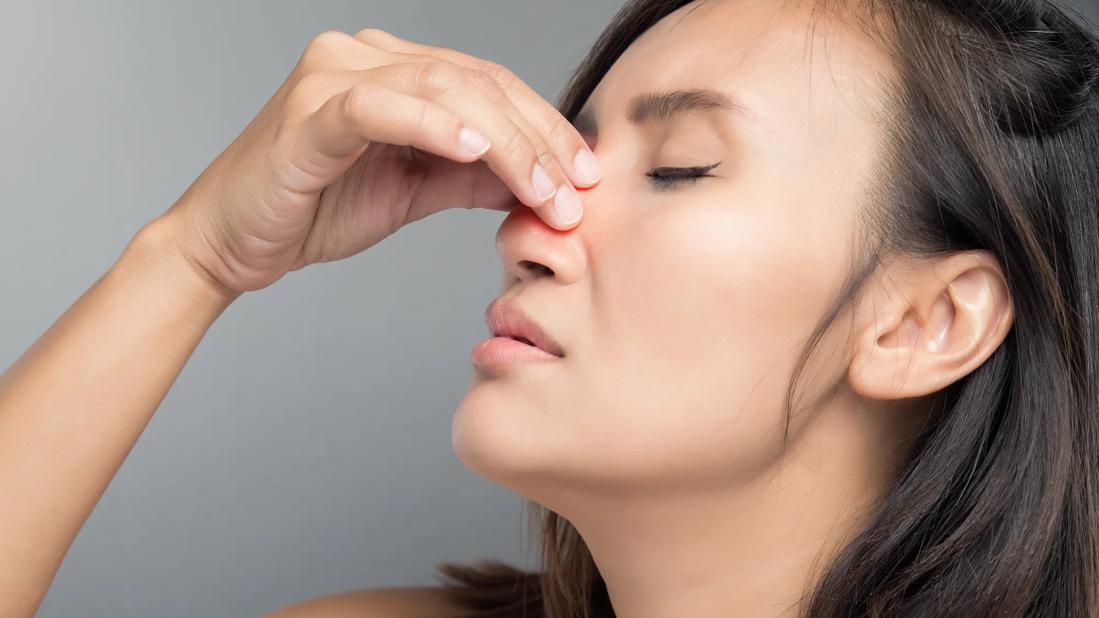How To Manage Nasal Polyps Symptoms
Avoid irritants and allergens, run a humidifier, try saline rinses and ask a healthcare provider about medications

Life with nasal polyps can be frustrating. You may feel constantly congested or have a runny nose that never seems to go away. You might feel facial pain or pressure, be prone to sinus infections or even notice that your sense of smell has changed.
So, is there anything you can do to manage nasal polyps on your own? Otolaryngologist Troy Woodard, MD, weighs in on how to find relief.
Should I remove nasal polyps myself?
We can’t stress this enough: You should never, ever try to remove your own nasal polyps.
“Trying to remove nasal polyps yourself can cause excessive bleeding and injury, and it can lead to infection,” Dr. Woodard warns. “You could also cause a septal perforation, where you damage the structures inside your nose that filter and moisturize the air.”
It’s also important to get a proper diagnosis. If you peek up your nose in the mirror and see bumps, you might assume they’re nasal polyps. But there’s always a chance you could be wrong — in fact, you usually can’t see your own nasal polyps.
“It’s very difficult to tell if you have nasal polyps or not,” he continues. “An otolaryngologist needs to take a good look inside the nose to determine if your congestion is due to polyps or just swelling.”
Make an appointment with a healthcare provider who can figure out the cause of your symptoms and help you manage them.
Remedies to manage this condition
Only medication or surgery can treat nasal polyps. But there are things you can do to try to lessen your symptoms and keep polyps from growing bigger.
Avoid triggers and allergens
Allergens and other substances in the air can inflame your nasal passages. Inflammation is linked to the growth of nasal polyps, so it’s best to avoid:
- Environmental allergens, like pollen, dust and pet dander
- Chemical fumes, like formaldehyde, arsenic and solvents
- Other types of fumes, like exhaust or welding fumes
- Smoke (including but not limited to cigarette smoke)
“In patients who have allergies, we often turn to medications like nasal or oral steroids, or even antihistamines,” Dr. Woodard says. “This can help reduce chronic inflammation and prevent polyps from getting worse.”
Manage allergies and other conditions
In addition to allergies, other respiratory conditions that may be associated with nasal polyps include:
“Your body’s inflammatory response causes fluid to gather in your nasal lining and form the outpouches, or soft masses, that become nasal polyps,” Dr. Woodard explains.
If you have one of these conditions, it’s important to work with your healthcare providers to keep them well-managed to help prevent nasal polyps from developing.
Use a humidifier
Dry air dries out your nasal passages, causing irritation and — you guessed it — inflammation. Running a humidifier adds moisture to the air, which in turn helps keep your nasal passages moist, too.
There are many types of humidifiers on the market, but no matter which you choose, they can help alleviate the symptoms of nasal dryness and congestion.
Try nasal irrigation
Nasal irrigation can flush allergens and other irritants out of your sinus passages. You can use a squeeze bottle or a device like a neti pot to push saline solution through your nasal passages. Research shows they can help manage symptoms associated with nasal polyps.
“Rinsing out your sinuses with saline irrigation can help thin mucus and flush it from your nasal cavity,” Dr. Woodard explains.
Ask about medications
Managing your nasal polyps on your own often isn’t enough to keep you feeling good, so ask a healthcare provider what treatment options they recommend. They may suggest steroid nasal sprays, steroid pills or injections of an anti-inflammatory medication that can help reduce congestion and nasal inflammation and shrink polyps.
“Medications are the least invasive approach to nasal polyps,” Dr. Woodard notes. “They help reduce inflammation and congestion, shrink the size of nasal polyps and ultimately make it easier for you to breathe.”
When surgery may be needed
If medications don’t do the trick or if your polyps are very large, your provider may recommend surgery. This typically means endoscopic sinus surgery to remove the polyps and help your sinuses drain better.
“As nasal polyps grow, they often lead to nasal obstruction that makes you feel congested and unable to breathe properly,” Dr. Woodard says. “They often block the drainage of the sinus cavities, which can lead to recurrent sinus infections.”
If you’re experiencing these symptoms and can’t seem to find relief on your own, it’s important to talk to a healthcare provider about next steps.
A final word on managing nasal polyps
If you have nasal polyps, there are steps you can take to try to keep symptoms at bay. But you won’t be able to get rid of them completely without help from a healthcare provider — and even then, polyps may return.
“In many cases, we can significantly improve your symptoms with medications and possibly surgery,” Dr. Woodard states. “But it’s important to know that nasal polyps can sometimes come back, especially if the underlying condition — like allergies or chronic sinusitis — isn’t treated.”
Your provider will want to make sure your polyps haven’t returned and adjust your treatment as needed. So, even if your polyps have been removed via surgery, continue to see your provider for follow-up appointments.